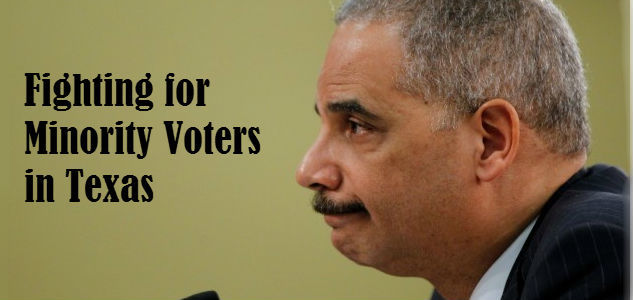
Democracy, elections and voting at Democracy Chronicles
State has drawn condemnation leading to the latest Texas voter ID lawsuit to protect the minority vote again. The Justice Department under election protecting Attorney General Eric Holder is leading new lawsuit against Texas to prevent its new onerous voter ID requirements from disqualifying huge numbers of minority and poor voters. Ballot Access News, written by Richard Winger, had the latest news in U.S. Government Files New Lawsuit to Invalidate Texas Government Photo-ID Law. Take a look:
On August 22, the United States filed a lawsuit in federal court in Corpus Christi, alleging that the Texas government photo-ID law passed in 2011 (and not yet implemented) violates Section Two of the Voting Rights Act, and the 14th and 15th amendments. The case is U.S.A. v State of Texas, 2:13cv263. It will go to a three-judge court. Here is the Complaint. The Complaint alleges that some Texas residents who don’t have the needed ID would be forced to make a round trip of up to 200 miles to obtain such an ID. The Complaint also points out that some of the offices that issue state ID’s are not open in the evening or on weekends, so that some applicants would need to miss work in order to obtain Texas Voter ID.
The 2011 law had not been implemented because neither the Justice Department, nor another federal court, pre-cleared the law. Now that the preclearance portion of the Voting Rights Act is effectively no longer workable, the Justice Department is using Section 2 of the Act. Section 2 applies to the entire nation and does not permit any state to pass a law that injures the voting rights of racial and ethnic minorities. Thanks to Rick Hasen for the link.
According to new information from the New York Times, the move by the Justice Department and Eric Holder will be facing some unprecedented barriers to their efforts in protecting voters thanks to the Supreme Court’s dismantling of the Voting Rights Act only months ago.
The Justice Department said it would file paperwork to become a co-plaintiff in an existing lawsuit brought by civil rights groups and Texas lawmakers against a Texas redistricting plan. Separately, the department said, it filed a new lawsuit over a state law requiring voters to show photo identification. In both cases, the administration is asking federal judges to rule that Texas has discriminated against voters who are members of a minority group, and to reimpose on Texas a requirement that it seek “pre-clearance” from the federal government before making any changes to election rules. In June, the Supreme Court removed the requirement by striking down part of the Voting Rights Act.
Holder is not being subtle in his quest for better voting methods either. “We will not allow the Supreme Court’s recent decision to be interpreted as open season for states to pursue measures that suppress voting rights,” Mr. Holder said, adding: “We will keep fighting aggressively to prevent voter disenfranchisement.” In the Justice Department complaint there was more interesting information on the Texas law and state of elections:
The Attorney General files this action pursuant to Sections 2 and 12(d) of the Voting Rights Act, 42 U.S.C. §§ 1973 & 1973j(d), to enforce the voting rights guaranteed by the Fourteenth and Fifteenth Amendments to the United States Constitution. According to the 2010 Census, Texas had a total population of 25,145,561, with a Hispanic population of 9,460,921 (37.6%) and a non-Hispanic black population of 2,975,739 (11.8%). There is no driver license office in scores of Texas counties, and driver license offices in dozens of additional counties are open only one or two days a week. Each of the documents needed to procure an EIC (state ID) costs money to obtain. A copy of a certified birth certificate from the Texas Bureau of Vital Statistics—the least expensive option for those born in Texas—is $22. It costs $345 to obtain a copy of U.S. citizenship or naturalization papers.
Leave a Reply